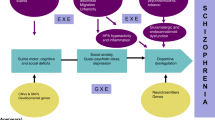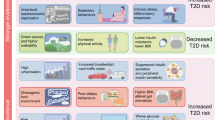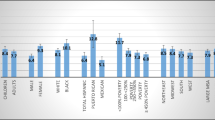Abstract
Environmental epigenetic regulation in asthma and allergic disease is an exciting area that has gained a great deal of scientific momentum in recent years. Environmental exposures, including prenatal maternal smoking, have been associated with asthma-related outcomes that may be explained by epigenetic regulation. In addition, several known allergy and asthma genes have been found to be susceptible to epigenetic regulation. We review the latest experimental and translational studies that have been published this past year in several areas, including 1) characterization of environmental asthma triggers that induce epigenetic changes, 2) characterization of allergic immune and regulatory pathways important to asthma that undergo epigenetic regulation, 3) evidence of active epigenetic regulation in asthma experimental models and the production of asthma biomarkers, 4) evidence of transmission of an asthma-related phenotype across multiple generations, and 5) “pharmaco-epigenetics.” The field has certainly advanced significantly in the past year.
Similar content being viewed by others
References
Papers of particular interest, published recently, have been highlighted as:• Of importance •• Of major importance
Alati R, Al-Mamun A, O’Callaghan M, Najman JM, Williams GM. In utero and postnatal maternal smoking and asthma in adolescence. Epidemiology. 2006;17(2):138–44.
Eisner MD. Environmental tobacco smoke exposure and pulmonary function among adults in NHANES III: impact on the general population and adults with current asthma. Environ Health Perspect. 2002;110(8):765–70.
Litonjua A, Carey VJ, Burge HA, Weiss ST, Gold DR. Parental history and the risk for childhood asthma. Does mother confer more risk than father? Am J Respir Crit Care Med. 1998;158(1):176–81.
Lim RH, Kobzik L, Dahl M. Risk for asthma in offspring of asthmatic mothers versus fathers: a meta-analysis. PLoS One. 2010;5(4):e10134.
Mandhane PJ, Greene JM, Cowan JO, Taylor DR, Sears MR. Sex differences in factors associated with childhood- and adolescent-onset wheeze. Am J Respir Crit Care Med. 2005;172:45–54.
de Marco R, Marcon A, Jarvis D. Prognostic factors of asthma severity: a 9-year international prospective cohort study. J Allergy and Clin Immunol. 2006;117:1249–56.
Burgess J, Matheson M, Gurrin L, Byrnes G, Adams K, Wharton C, et al. Factors influencing asthma remission: a longitudinal study from childhood to middle age. Thorax. 2011;66(6):508–13.
Liu J, Ballaney M, Al-alem U, Quan C, Jin X, Perera F, et al. Combined inhaled diesel exhaust particles and allergen exposure alter methylation of T helper genes and IgE production in vivo. Toxicol Sci. 2008;102(1):76–81.
Webster RB, Rodriguez Y, Klimecki W, Vercelli D. The human IL-13 locus in neonatal CD4+ T cells is refractory to the acquisition of a repressive chromatin architecture. J Biol Chem. 2007;282(1):700–9.
White GP, Hollams EM, Yerkovich ST, Bosco A, Holt BJ, Bassami MR, et al. CpG methylation patterns in the IFNg promoter in naive T cells: variations during Th1 and Th2 differentiation and between atopics and non-atopics. Pediatr Allergy Immunol. 2006;17:557–64.
Jones B, Chen J. Inhibition of IFN-g transcription by site-specific methylation during T helper cell development. EMBO J. 2006;25:2443–52.
Schoenborn J, Dorschner M, Sekimata M, Santer D, Shnyreva M, Fitzpatrick D, et al. Comprehensive epigenetic profiling identifies multiple distal regulatory elements directing transcription of the gene encoding interferon-gamma. Nat Immunol. 2007;8:732–42.
Akimzhanov A, Yang X, Dong C. Chromatin remodeling of interleukin-17 (IL-17)-IL-17F cytokine gene locus during inflammatory helper T cell differentiation. J Biol Chem. 2007;282(9):5969–72.
Huehn J, Polansky JK, Hamann A. Epigenetic control of FOXP3 expression: the key to a stable regulatory T-cell lineage? Nat Rev Immunol. 2009;9(2):83–9.
Tarantini L, Bonzini M, Apostoli P, Pegoraro V, Bollati V, Marinelli B, et al. Effects of particulate matter on genomic DNA methylation content and iNOS promoter methylation. Environ Health Perspect. 2009;117:217–22.
Breton CV, Byun H-M, Wang X, Salam MT, Siegmund K, Gilliland FD. DNA methylation in the ARG-NOS pathway is associated with exhaled nitric oxide in asthmatic children. Am J Respir Crit Care Med. 2011;184(2):191–97.
Miller RL, Ho S. Environmental epigenetics and asthma: current concepts and call for studies. Am J Respir Crit Care Med. 2008;177:567–73.
Kuriakose JS, Miller RL. Environmental epigenetics and allergic diseases: recent advances. Clin Exp Allergy. 2010;40(11):1602–10.
Martino D, Prescott S. Silent mysteries: epigenetic paradigms could hold the key to conquering the epidemic of allergy and immune disease. Allergy. 2010;65(1):7–15.
Baccarelli A, Wright RO, Bollati V, Tarantini L, Litonjua AA, Suh HH, et al. Rapid DNA methylation changes after exposure to traffic particles. Am J Respir Crit Care Med. 2009;179:572–8.
Cao D, Bromberg PA, Samet JM. COX-2 expression induced by diesel particles involves chromatin modification and degradation of HDAC1. Am J Respir Cell Mol Biol. 2007;37(2):232–9.
Kwon N-H, Kim J-S, Lee J-Y, Oh M-J, Choi D-C. DNA methylation and the expression of IL-4 and IFN-γ promoter genes in patients with bronchial asthma. J Clin Immunol. 2008;28:139–46.
Su R, Becker A, Kozyrskyj A, Hayglass K. Epigenetic regulation of established human type 1 versus type 2 cytokine responses. J Allergy and Clin Immunol. 2008;121(1):57–63.
Ito K, Lim S, Caramori G, Chung KF, Barnes PJ, Adcock IM. Cigarette smoking reduces histone deacetylase 2 expression, enhances cytokine expression, and inhibits glucocorticoid actions in alveolar macrophages. FASEB J. 2001;15(6):1110–2.
Izzotti A, Calin G, Arrigo P, Steele V, Croce C, Flora SD. Downregulation of microRNA expression in the lungs of rats exposed to cigarette smoke. FASEB J. 2009;23(3):806–12.
Wilhelm-Benartzi C, Christensen B, Koestler D, Houseman EA, Schned A, Karagas M, et al. Association of secondhand smoke exposures with DNA methylation in bladder carcinomas. Canc Causes Contr. 2011;22(8):1205–13.
• Liu F, Killian J, Yang M, Walker R, Hong J, Zhang M, et al. Epigenomic alterations and gene expression profiles in respiratory epithelia exposed to cigarette smoke condensate. Oncogene. 2010;29:3650–64. This is one of the few studies of airway cells following environmental exposures. Several epigenetic alterations induced by exposure to cigarette smoke condensate were identified. There was also time-dependent demethylation at several sites implicated in carcinogenesis in the lung.
• Breton CV, Byun H-M, Wenten M, Pan F, Yang A, Gilliland FD. Prenatal tobacco smoke exposure affects global and gene-specific DNA methylation. Am J Respir Crit Care. 2009;180:462–7. This was the first paper to look at DNA methylation of specific asthma genes and biomarkers of airway inflammation. The authors found that DNA methylation in the ARG gene was associated inversely with FENO, a marker of airway inflammation.
Patel MM, Miller RL. Air pollution and childhood asthma: recent advances and future directions. Curr Opin Pediatr. 2009;21:235–42.
Morgenstern V, Zutavern A, Cyrys J, Brockow I, Koletzko S, Krämer U, et al. Atopic diseases, allergic sensitization, and exposure to traffic-related air pollution in children. Amer J Respir Crit Care Med. 2008;177(12):1331–37.
Perera F, Tang WY, Herbstman J, Tang D, Levin L, Miller R, et al. Relation of DNA methylation of 5′-CpG island of ACSL3 to transplacental exposure to airborne polycyclic aromatic hydrocarbons and childhood asthma. PLoS One. 2009;4(2):e4488.
Teneng I, Montoya-Durango DE, Quertermous JL, Lacy ME, Ramos KS. Reactivation of L1 retrotransposon by benzo(a)pyrene involves complex genetic and epigenetic regulation. Epigenetics. 2011;6(3):355–67.
• Nadeau K, McDonald-Hyman C, Noth E, Pratt B, Hammond S, Balmes J, et al. Ambient air pollution impairs regulatory T-cell function in asthma. J Allergy and Clin Immunol. 2010;126(4):845–52. This study found decreased Treg function in asthmatics living in high-pollution neighborhoods. There was also increased methylation and decreased expression of the FoxP3 gene locus (important in Treg expression) in the exposed asthmatics, suggesting an important link between Treg, FoxP3, and asthma severity in high-pollution neighborhoods.
Patel MM, Hoepner L, Garfinkel R, Chillrud S, Reyes A, Quinn JW, et al. Ambient metals, elemental carbon, and wheeze and cough in New York City children through 24 months of age. Am J Respir Crit Care Med. 2009;180(11):1107–13.
Hamada K, Suzaki Y, Leme A, Ito T, Miyamoto K, Kobzik L, et al. Exposure of pregnant mice to an air pollutant aerosol increases asthma susceptibility in offspring. J Toxicol Environ Health. 2007;70(8):688–95.
•• Bollati V, Marinelli B, Apostoli P, Bonzini M, Nordio F, Hoxha M, et al. Exposure to metal-rich particulate matter modifies the expression of candidate microRNAs in peripheral blood leukocytes. Environ Health Perspect. 2010;118:763–8. The authors measured specific miRNAs implicated in inflammation and oxidative stress in electric furnace steel plant workers at baseline and after 3 days of work-related exposure to particulate matter. Their important work found that levels of exposure to particulate matter were associated with upregulation and downregulation of these miRNAs.
Devereux G, Turner SW, Craig LC, McNeill G, Martindale S, Harbour PJ, et al. Low maternal vitamin E intake during pregnancy is associated with asthma in 5-year-old children. Am J Respir Crit Care Med. 2006;174(5):499–507.
Salem M, Li Y, Langholz B, Gilliland F. Maternal fish consumption during pregnancy and risk of early childhood asthma. J Asthma. 2005;42:513–18.
Hollingsworth JW, Maruoka S, Boon K, Garantziotis S, Li Z, Tomfohr J, et al. In utero supplementation with methyl-donors enhances allergic airway disease in mice. J Clin Investig. 2008;118(10):3462–9.
Miller RL. Prenatal maternal diet and asthma risk. J Clin Investig. 2008;118(10):3265–68.
Håberg SE, London SJ, Stigum H, Nafstad P, Nystad W. Folic acid supplements in pregnancy and early childhood respiratory health. Arch Dis Child. 2009;94:180–4.
Whitrow M, Moore V, Rumbold A, Davies M. Effect of supplemental folic acid in pregnancy on childhood asthma: a prospective birth cohort study. Am J Epidemiol. 2009;170:1486–93.
Matsui E, Matsui W. Higher serum folate levels are associated with a lower risk of atopy and wheeze. J Allergy Clin Immunol. 2009;123(6):1253–9.
Håberg SE, London S, Nafstad P, Nilsen R, Ueland P, Vollset S, et al. Maternal folate levels in pregnancy and asthma in children at age 3 years. J Allergy and Clin Immunol. 2010;127(1):262–4.
•• Magdelijns FH, Mommers M, Penders J, Smits L, Thijs C. Folic acid use in pregnancy and the development of atopy, asthma, and lung function in childhood. Pediatrics. 2011;128:e135–e44. This study of prenatal folic acid supplementation and the risk of asthma-related outcomes (wheeze, atopy) found no association between the two. In fact, higher maternal serum folic acid levels were associated with decreased risk of asthma.
Devereux G, Litonjua A, Turner SW, Craig LC, McNeill G, Martindale S, et al. Maternal vitamin D intake during pregnancy and early childhood wheezing. Am J Clin Nutr. 2007;85(3):853–59.
Paul G, Brehm J, Alcorn J, Holguin F, Aujla S, Celedón J (2012) Vitamin D and asthma. Am J Respir Crit Care in press
Sundar IK, Rahman J. Vitamin D and suscpetibility of chronic lung diseases: role of epiegentics. Front Pharmacol. 2011;2:1–10.
Fu G, Zhong Y, Li C, Li Y, Lin X, Liao B, et al. Epigenetic regulation of peanut allergen gene Ara h 3 in developing embryos. Planta. 2010;231(5):1049–60.
Lee DU, Agarwal S, Rao A. Th2 lineage commitment and efficient IL-4 production involves extended demethylation of the IL-4 gene. Immunity. 2002;16:649–60.
Lee G, Fields P, Griffin T, Flavell R. Regulation of the Th2 cytokine locus by a locus control region. Immunity. 2003;19:145–53.
Bluestone JA, Mackay CR, O’Shea JJ, Stockinger B. The functional plasticity of T cell subsets. Nat Rev Immunol. 2009;9:811–6.
Vuillermin PJ, Ponsonby A-L, Saffery R, Tang ML, Ellis JA, Sly P, et al. Microbial exposure, interferon gamma gene demethylation in naıve T-cells, and the risk of allergic disease. Allergy. 2009;64:348–53.
Janson P, Winerdal M, Winqvist O. At the crossroads of T helper lineage commitment-epigenetics points the way. BIochim Biophys Acta. 2009;1790(9):906–19.
Toker A, Huehn J. To be or not to be a T reg cell: Lineage decisions controlled by epigenetic mechanisms. Science Signaling. 2011;4(158):e4.
•• Leung S, Liu X, Fang L, Chen X, Guo T, Zhang J. The cytokine milieu in the interplay of pathogenic Th1/Th17 cells and regulatory T cells in autoimmune disease. Cell Mo Immunol. 2010;7(3):182–89. Following ovalbumin challenge in the cLCR knockout mice, there was reduction in systemic and airway inflammation, hyperresponsiveness, and mucus production. This study sheds light on the significance of chromatin remodeling in the Th2 LCR and the development of allergic asthma.
Janson PCJ, Linton LB, Bergman EA, Marits P, Eberhardson M, Piehl F, et al. Profiling of CD4+ T cells with epigenetic immune lineage analysis. J Immunol. 2011;186:92–102.
Koh BH, Hwang SS, Kim JY, Lee W, Kang M-J, Lee CG, et al. Th2 LCR is essential for regulation of Th2 cytokine genes and for pathogenesis of allergic asthma. PNAS. 2010;107(23):10614–19.
Grausenburger R, Bilic I, Boucheron N, et al. Conditional deletion of histone deacetylase 1 in T cells leads to enhanced airway inflammation and increased Th2 cytokine production. J Immunol. 2010;185:3489–97.
Sonkoly E, Janson P, Majuri M-L, Savinko T, Fyhrquist N, Eidsmo L, et al. MiR-155 is overexpressed in patients with atopic dermatitis and modulates T-cell proliferative responses by targeting cytotoxic T lymphocyte–associated antigen 4. J Allergy and Clin Immunol. 2010;126:581–89.
Lim EJ, Lu TX, Blanchard C, Rothenberg ME. Epigenetic regulation of the IL-13-induced human eotaxin-3 gene by CREB-binding protein-mediated histone 3 acetylation. J Biol Chem. 2011;286(15):13193–204.
•• Kim E-G, Shin H-J, Lee CG, Park H-Y, Kim Y-K, Park H-W, et al. DNA methylation and not allelic variation regulates STAT6 expression in human T cells. Clin Exp Med. 2010;10:143–52. This is one of the first papers to elucidate the mechanisms of epigenetic regulation of STAT6, a transcription factor thought to be important in Th2 cell differentiation.
•• Tanaka S, Motomura Y, Suzuki Y, Yagi R, Inoue H, Miyatake S, et al. The enhancer HS2 critically regulates GATA-3-mediated Il4 transcription in TH2 cells. Nature Immunol. 2010;12(1):77–86. The authors studied chromosomal regulation of IL-4 production by the transcription factor GATA-3. These findings suggest that DNase I-hypersensitive site 2 is an important target in the regulation of chromosomal modification of the IL-4 locus.
Akimzhanov A, Yang X, Dong C. Chromatin remodeling of interleukin-17 (IL-17)-IL-17F cytokine gene locus during inflammatory helper T cell differentiation. J Biol Chem. 2007;282(9):5969–72.
Mukasa R, Balasubramani A, Lee YK, Whitley SK, Weaver BT, Shibata Y, et al. Epigenetic instability of cytokine and transcription factor gene loci underlies plasticity of the T helper 17 cell lineage. Immunity. 2010;32:616–27.
Schaub B, Liu J, Hoppler S, Schleich I, Huehn J, Olek S, et al. Maternal farm exposure modulates neonatal immune mechanisms through regulatory T cells. J Allergy and Clin Immunol. 2009;123:774–82.
• Lal G, Bromberg JS. Epigenetic mechanisms of regulation of Foxp3 expression. Blood. 2009;114:3727–35. The authors offer an excellent summary of the different epgenetic markers of FoxP3 and the importance in Treg expression and suppression.
Kim B-S, Kim I-K, Park Y-J, Kim Y-S, Kim Y-J, Chang W-S, et al. Conversion of Th2 memory cells into Foxp3+ regulatory T cells suppressing Th2-mediated allergic asthma. PNAS. 2010;107(19):8742–47.
Fedulov AV, Kobzik L. Allergy risk is mediated by dendritic cells with congenital epigenetic ehanges. Am J Respir Cell Mol Biol. 2011;44:285–92.
Kumar M, Ahmad T, Sharma A, Mabalirajan U, Kulshreshtha A, Agrawal A, et al. Let-7 microRNA–mediated regulation of IL-13 and allergic airway inflammation. J Allergy Clin Immunol. 2011;128(5):1077–85.
• Polikepahad S, Knight JM, Naghavi AO, Oplt T, et al. Proinflammatory role for let-7 microRNAS in experimental asthma. J Biol Chem. 2010;285(39):30139–49. Contrary to the authors’ hypothesis, inhibition of let-7 led to reduction in allergic cytokine production, suggesting significant complexities in these pathways. Nonetheless, miRNAs, namely the abdundant let-7, appear to play an important role in allergic lung disease.
Collison A, Mattes J, Plank M, Foster PS. Inhibition of house dust mite–induced allergic airways disease by antagonism of microRNA-145 is comparable to glucocorticoid treatment. J Allergy and Clin Immunol. 2011;128:160–67.
Isidoro-Garcıa M, Sanz C, Garcıa-Solaesa V, Pascual M, Pescador DB, Lorente F, et al. (2011) PTGDR gene in asthma: a functional, genetic, and epigenetic study. Allergy
Morgan H, Sutherland H, Martin D, Whitelaw E. Epigenetic inheritance at the agouti locus in the mouse. Nat Genetics. 1999;23(3):314–8.
Waterland RA, Jirtle RL. Transposable elements: targets for early nutritional effects on epigenetic gene regulation. Mol Cell Biol. 2003;23(15):5293–300.
Skinner M, Guerrero-Bosagna C. Environmental signals and transgenerationa; epigenetics. Epigenomics. 2009;1(1):111–17.
Douwes J, Cheng S, Travier N, et al. Farm exposure in utero may protect against asthma, hay fever, and eczema. Eur Respir J. 2008;32(3):603–11.
• Lin L, Zhu H, Quan C, Grunig G, Ballaney M, Jin X, et al. Prenatal allergen and diesel exhaust exposure and their effects on allergy in adult offspring mice. Allergy Asthma Clin Immunol. 2010;6(1):7. This is one of the few studies to look at the long-term effects of prenatal allergen and environmental pollution exposure on adult offspring mice. The study found a decrease in IgE production in mice exposed prenatally to A. fumigatus or diesel exhaust particles. Mice that were exposed to both allergen and pollutant were found to have decreased airway eosinophilia.
Schmitz RJ, Schultz MD, Lewsey MG (2011) Transgenerational epigenetic instability is a source of novel methylation variants. ScienceExpress 1
Barnes P. Targeting the epigenome in the treatment of asthma and chronic obstructive pulmonary disease. Proc Am Thorac Soc. 2009;6:693–96.
• Williams A, Larner-Svensson H, Perry M, Campbell G, Herrick S, Adcock I, et al. MicroRNA expression profiling in mild asthmatic human airways and effect of corticosteroid. PLoS One. 2009;4(6):e5889. The authors studied the effects of the PGI 2 analogue iloprost on histone modifications in the Th1 and Th2 pathways. They found that iloprost had enhancing effects of histones in the Th2 pathway (histone H3 acetylation) versus suppressive effects of the Th1 pathway.
Kuo C-H, Ko Y-C, Yang S-N, Chu Y-T, Wang W-L, Huang S-K, et al. Effects of PGI2 analogues on Th1- and Th2-related chemokines in monocytes via epigenetic regulation. J Mol Med. 2011;89:29–41.
Acknowledgments
Dr. Lovinsky-Desir has received grant support from the National Institutes of Health T32 Training Grant.
Dr. Miller has received grant support from the National Institutes of Health, the Environmental Protection Agency, and the Thrasher Foundation.
Disclosure
No potential conflicts of interest relevant to this article were reported.
Author information
Authors and Affiliations
Corresponding author
Rights and permissions
About this article
Cite this article
Lovinsky-Desir, S., Miller, R.L. Epigenetics, Asthma, and Allergic Diseases: A Review of the Latest Advancements. Curr Allergy Asthma Rep 12, 211–220 (2012). https://doi.org/10.1007/s11882-012-0257-4
Published:
Issue Date:
DOI: https://doi.org/10.1007/s11882-012-0257-4




